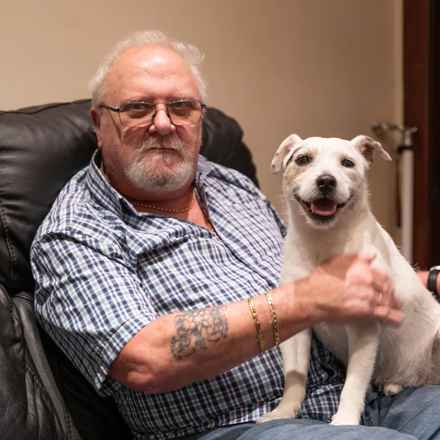“I will not be identified by my macular disease”
Posted: Friday 25 April 2025
From experiencing “sheer hell” in the aftermath of his diagnosis to getting his life back on track, Duncan knows all too well how important a positive mindset has been for adapting to a life with macular disease.
He used to travel the globe as part of a job he adored, but when sight loss took away his ability to drive, his world was turned upside down as he suffered various personal tragedies.
Duncan said: “Being told I had macular degeneration was a shock. I lost everything after I was diagnosed and there came a stage where I soon needed to pick myself up. Ever since then I’ve kept this positive mental attitude because I was at the very bottom, I’ve had clinical depression, but I’ve come through it and now I do whatever I can to live my life.”
"Everything changed" - the impact of Duncan's diagnosis
Duncan was an international truck driver until 17 years ago when he was given his age-related macular degeneration (AMD) diagnosis and saw his licence revoked by the DVLA. He still receives injections to treat one eye, but considers himself “blind” in the other.
“I had a lovely home, with two cars on the drive and I was happily married. The bills were paid, we holidayed, there was money in the bank and life was sweet. But I lost my job as soon as my driving licence was taken away and very soon everything changed.”
He remembers the consultant delivering the news and hearing: “you've got AMD, you're going to go blind.”.
Duncan, 67, said: “I now know that with macular disease you don’t go completely blind but I went out and into the car and my heart was broken. I sat there with my then wife and I thought ‘what is happening to me?’ I was an international truck driver, I couldn’t afford to lose my sight.
“What followed in my life was absolutely sheer hell. I lost everything that mattered to me, not just my sight, and I had no control over any of it.”
Duncan admitted how, in the years that followed, “depression dragged me to the depths of almost suicide”. But, he reached a point where he knew enough was enough.
He said: “I wasn’t going to let it take any more from me and I started to pick myself up. I now say I don’t suffer with sight loss; I live with it. I will not be identified by what I have. It wasn’t my best news but you have to get on with it.”
Seeking support from others
He found support from the Macular Society and other organisations, which helped Duncan make the best use of his peripheral vision.
He said: “I knew there was no cure for what I had, so I had to face it and live life as best as I could and that’s when I started to look for people to help.
“A big part of that was swallowing my pride a little. I really do cling to my independence but there comes a point where you need help, you need to accept you’re not dealing with this and so I reached out to Edward Bebbington, a volunteer with the Macular Society who lives locally to me.
“He and I remain in contact with each other now and he really helped me with the Eccentric Viewing (EV) training.”
Adaptability and a changing mindset
Duncan described how others have held his hand to overcome the hurdles he has faced. He now approaches them with a clear, focused mindset.
“I can’t write anymore, whereas I used to pride myself on having beautiful handwriting so you have to find ways of getting around it,” he said. “If I’m making a cup of tea I now use a liquid level indicator, and I have a talking watch. There are an awful lot of gadgets out there and on Amazon I can buy cards and type what I want printed.
“What this all comes down to is adapting and finding ways around everyday things. I've still got a life to live, with or without my sight and I still have to eat, I still have to drink.
“Mentally you have to accept it is what it is, and the better mental attitude you have towards it, the better you will be able to cope. Otherwise you'll be coping with AMD and depression – depression is the killer.
“A positive mental attitude is so very important."
Duncan's future hopes of Beating Macular Disease
Duncan is staying hopeful about the future of macular disease, not just for himself, but for younger generations as well.
He added: “I believe it's too late for me, but I honestly believe that we're not far away from a cure. AMD is the greatest cause of sight loss in the world today, so what’s important is that there are scientists working on this 24/7 and I do believe we’re not far away.
“Knowing children are affected by macular disease too is serious and while I think it’s too late for me, certainly for children who are suffering with this, it needs to be addressed.”
Skills for seeing
Teaching you skills that could help you continue reading, enjoying TV, staying independent and doing the things you love, with macular disease.
Counselling
Are you dealing with the emotional challenges of macular disease? It can help to speak to a professional counsellor, who is trained to listen and to talk through your feelings and help you find ways of dealing with them.




